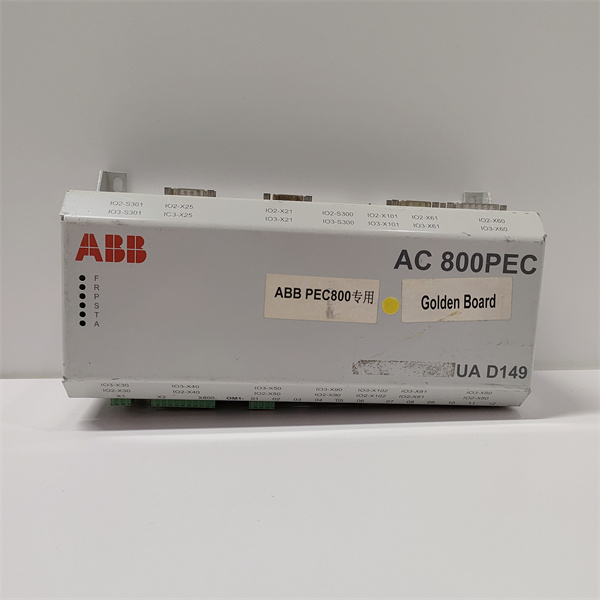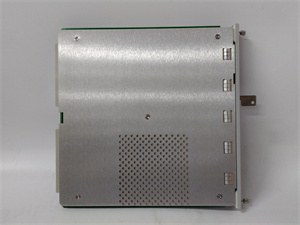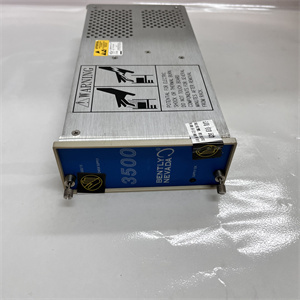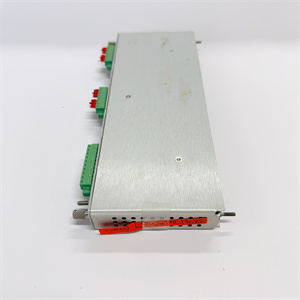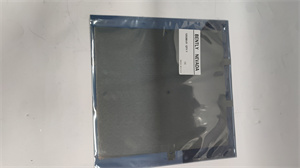Description
Detailed parameter table
| Parameter name | Parameter value |
| Product model | UAD149A0001 3BHE014135R0001 |
| Manufacturer | ABB |
| Product category | Industrial control interface module |
| Rated voltage | 24 V DC ±10% |
| Power consumption | ≤5 W |
| Input signals | 8 analog inputs (4-20 mA, 0-10 V) |
| Output signals | 4 analog outputs (4-20 mA) |
| Communication interface | RS485 (Modbus RTU), Ethernet (Modbus TCP) |
| Operating temperature | -20°C to 60°C |
| Dimensions | 120 mm × 80 mm × 60 mm |
| Mounting type | DIN rail mount (35 mm) |
| Protection rating | IP20 |
| Certifications | IEC 61131-2, CE, UL |
| Response time | ≤100 ms for analog signal processing |
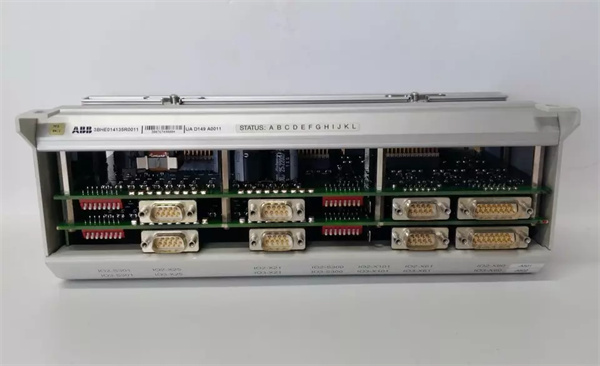
ABB UAD149A0001 3BHE014135R0001
Product introduction
The UAD149A0001 3BHE014135R0001 is a compact and versatile industrial control interface module from ABB, designed to serve as a bridge between field devices and higher-level control systems in industrial automation setups. This module is engineered to handle analog signal conversion, transmission, and integration, making it an essential component in applications where precise monitoring and control of analog parameters are required.
As part of ABB’s industrial control product lineup, the UAD149A0001 3BHE014135R0001 excels in converting raw analog signals from sensors (such as pressure, temperature, and flow sensors) into digital data that can be processed by PLCs, DCS, or SCADA systems. Conversely, it also converts digital control signals from these systems into analog outputs to drive actuators, valves, and other control devices. Its dual communication capabilities (RS485 and Ethernet) ensure seamless integration with both legacy and modern automation architectures, making it suitable for a wide range of industries including manufacturing, chemical processing, and energy production.
Core advantages and technical highlights
Dual communication flexibility
The UAD149A0001 3BHE014135R0001 supports both RS485 (Modbus RTU) and Ethernet (Modbus TCP) protocols, enabling it to connect with a diverse range of control systems. This flexibility is particularly valuable in mixed automation environments where some components use legacy serial communication while others leverage industrial Ethernet. For example, in a food processing plant, it can communicate with an older PLC via RS485 while sending real-time data to a modern SCADA system over Ethernet, ensuring smooth data flow across the entire automation network.
Precise analog signal handling
Equipped with 8 analog inputs and 4 analog outputs, this module delivers high-precision signal processing with a resolution of 16 bits. The analog inputs can accept both current (4-20 mA) and voltage (0-10 V) signals, allowing it to interface with various sensors without the need for additional signal converters. The outputs, capable of generating 4-20 mA signals, provide accurate control over actuators. In a water treatment facility, this precision ensures that pH levels and chemical dosing rates are monitored and adjusted with minimal error, maintaining water quality within strict standards.
Compact and easy integration
With its small form factor (120 mm × 80 mm × 60 mm) and DIN rail mounting design, the UAD149A0001 3BHE014135R0001 can be easily installed in crowded control cabinets. This space-saving feature is crucial in modern industrial setups where cabinet space is at a premium. Additionally, its plug-and-play configuration reduces installation time—technicians can quickly wire the module, configure communication settings via ABB’s configuration software, and integrate it into the existing system.
Reliable performance in harsh environments
Operating within a temperature range of -20°C to 60°C, the module withstands the temperature fluctuations common in industrial facilities. Its robust design ensures immunity to electromagnetic interference (EMI) and electrical noise, guaranteeing stable operation even near high-voltage equipment or motor drives. In a steel mill, for instance, it can reliably process temperature signals from furnace sensors despite the high levels of electrical noise in the environment.
Typical application scenarios
Chemical processing plant
In a chemical plant, the UAD149A0001 3BHE014135R0001 is used to monitor and control reactor conditions. It receives analog signals from pressure transmitters (4-20 mA) and temperature sensors (0-10 V) inside the reactor, converting these into digital data for the plant’s DCS via Ethernet. The DCS processes this data and sends control signals back to the module, which converts them into 4-20 mA outputs to adjust the flow of cooling water and reactant feed valves. This closed-loop control ensures that reactor conditions remain within safe operating limits, preventing accidents and ensuring product quality.
Manufacturing assembly line
On an automotive assembly line, the module interfaces with various sensors to monitor the performance of robotic arms. It collects analog signals from torque sensors (measuring the force applied by robotic grippers) and position sensors (tracking arm movement), transmitting this data to a PLC via RS485. The PLC uses the data to adjust the robotic arm’s operation, with the module converting the PLC’s digital control signals into analog outputs to modify motor speed and gripper pressure. This ensures precise assembly and reduces the risk of product damage.
Renewable energy facility
In a solar power plant, the UAD149A0001 3BHE014135R0001 monitors the performance of solar inverters. It receives analog signals representing DC voltage and current from the inverters, sending this data to a SCADA system over Ethernet. The SCADA system uses the data to optimize power output, and in turn, sends control signals to the module to adjust inverter settings via analog outputs. This helps maximize energy production and ensures the inverters operate within their efficiency range.
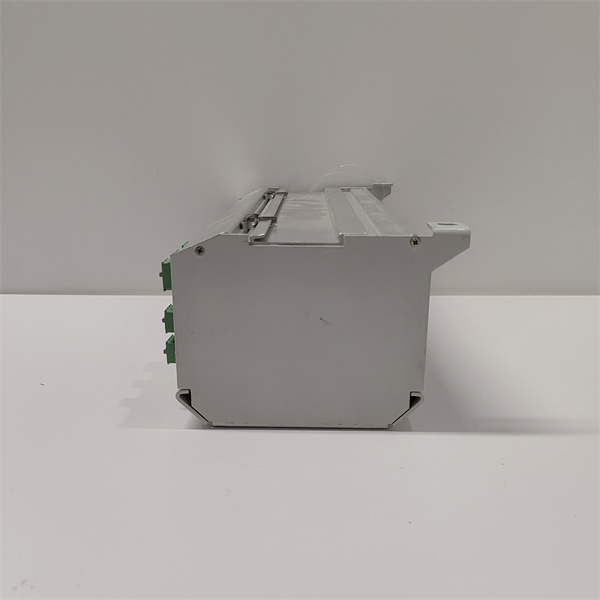
ABB UAD149A0001 3BHE014135R0001
Related model recommendations
ABB UFC760BE142 3BHE004573R0142
An industrial control unit that pairs with the UAD149A0001 3BHE014135R0001 in complex control systems. The UFC760BE142 handles higher-level control logic, while the UAD149A0001 focuses on analog signal processing, creating a comprehensive control solution.
ABB 3BHB003688R0101
A power module that provides stable 24 V DC power to the UAD149A0001 3BHE014135R0001, ensuring reliable operation in industrial environments where power fluctuations are common.
ABB CI854A 3BSE022469R1
A Profinet communication module that can be used alongside the UAD149A0001 3BHE014135R0001 to extend network connectivity, enabling integration with Profinet-based automation systems.
ABB TB857
A surge protection device installed upstream of the UAD149A0001 3BHE014135R0001 to protect it from voltage spikes and transient electrical disturbances, enhancing its longevity.
Installation, commissioning and maintenance instructions
Installation: Mount the UAD149A0001 3BHE014135R0001 on a 35 mm DIN rail in a control cabinet, ensuring at least 30 mm of clearance on all sides for ventilation. Connect the 24 V DC power supply using 0.75 mm² cable, protected by a 1 A fuse. Wire analog inputs from sensors to the designated terminals, ensuring correct polarity for current and voltage signals. Connect analog outputs to actuators using shielded cable, with shields grounded at both ends. For communication, connect Ethernet or RS485 cables to the respective ports, using shielded cable for RS485.
Commissioning: Use ABB’s Control Builder software to configure the module’s communication settings (IP address for Ethernet, baud rate for RS485) and signal ranges (e.g., scaling 4-20 mA inputs to 0-100°C for temperature sensors). Calibrate analog inputs and outputs using a precision signal generator to ensure accuracy within ±0.1% of full scale. Test communication with the target control system (PLC/DCS) to verify data transmission and reception.
Maintenance: Inspect the module quarterly for loose connections, dust accumulation, and damage to terminals. Clean dust from ventilation slots using compressed air. Verify signal accuracy semi-annually by comparing module readings with a calibrated test instrument. Check communication links monthly to ensure uninterrupted data flow. If the module fails to respond, check power supply and communication cables before replacing—use only ABB-certified replacements to maintain system compatibility.
Service and guarantee commitment
The UAD149A0001 3BHE014135R0001 is backed by a 3-year warranty from the date of installation, covering manufacturing defects and ensuring compliance with published performance specifications. ABB’s technical support team provides response within 24 hours for standard inquiries, with remote troubleshooting available to minimize downtime.
The warranty includes access to technical documentation, software updates, and calibration guides. Extended service contracts offer annual preventive maintenance, including calibration checks and firmware updates, to maximize the module’s reliability and lifespan. ABB’s commitment to quality ensures that the UAD149A0001 3BHE014135R0001 delivers consistent performance in industrial control applications.

